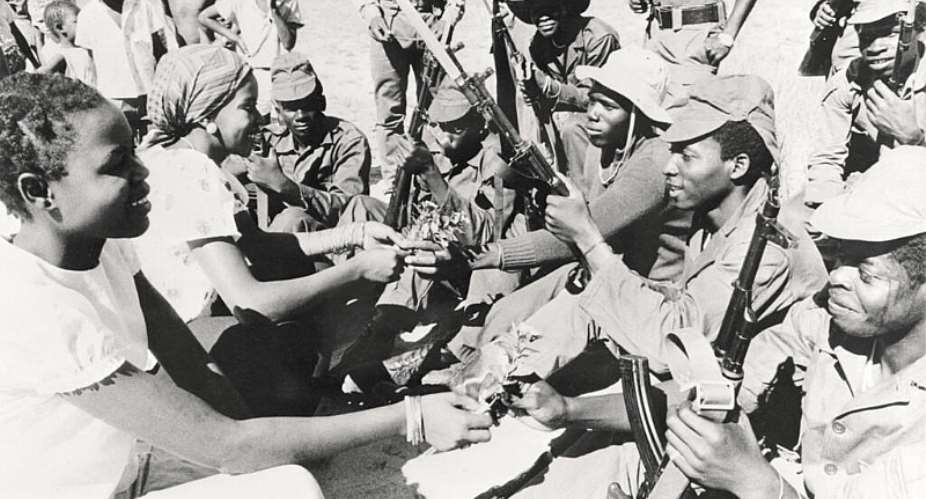Portugal this week marked the 50th anniversary of the Carnation Revolution – a pivotal moment in the country's history and its relationship with its African colonies.
On 25 April 1974 – after almost half a century of dictatorship – the military coup opened a new era.
Led by low-ranking officers within the Portuguese army and backed by widespread public support, the so-called Carnation Revolution not only toppled Portugal's authoritarian regime but signalled the end of its colonial wars in Africa.
The dictatorship established by Antonio de Oliveira Salazar had been at war with national movements demanding freedom from the Portuguese empire for more than 10 years.
In the aftermath of the revolution, all five of Portugal's African colonies – Mozambique, Guinea-Bissau, Cape Verde, Angola and Sao Tome and Príncipe – swiftly gained independence.
Those countries' heads of state were in Lisbon this week to join in the 50th anniversary celebrations – tribute to a struggle for freedom that spanned two continents.
Rebellion in Guinea-Bissau
By the spring of 1974, the battle for decolonisation was furthest advanced in Guinea-Bissau.
The country had unilaterally declared independence from Portugal in September 1973 as after 10 years of conflict that helped drive Portugal's own push for freedom.
"Many [officers] had passed through Guinea-Bissau. There were more deaths in Guinea-Bissau than anywhere else," says Mario Cissoko, who was then part of the PAIGC rebel group.
"We had a radio station in Conakry – Radio Libération. We communicated in Creole, Portuguese and the vernacular languages to raise awareness among all the people in areas controlled by the colonial forces," he told RFI.
"And even the Portuguese troops – we convinced them through the radio."
Young Portuguese recruits no longer wanted to do four years' military service in the country at the risk of dying in the name of a dictatorship, Cissoko says – and there were many deserters.
"We freed them ourselves and handed them over to the International Red Cross. All that played a part in the political mobilisation of Portuguese soldiers."
Wind of change
In Mozambique, an independence agreement was signed just months after Portugal's military revolted, in September 1974, and took effect the following year.
Joaquim Chissano, who would go on to be president of Mozambique, was a guerrilla fighter with the pro-independence Frelimo movement at the time.
"We heard about the coup in Portugal on the radio," he told RFI.
He and his fellow rebels were at a training camp in neighbouring Tanzania, and soon realised the events in Lisbon could create an opening for their fight to decolonise.
At the time, Chissano recalls, "we took the attitude that the coup d'etat would be the end of fascism – perhaps – but we couldn't assume that it was the end of colonialism.
"So we had to continue the struggle until we had the conditions to have our independence."
Catalyst effect
The events of April 1974 also catalysed Angola's journey to freedom.
The country had been engaged in a gruelling war for independence since 1961. After the revolution, negotiations between the Portuguese government and Angolan liberation movements gained momentum and led to the signing of independence agreements in 1975.
Angola proclaimed independence on 11 November the same year.
Cape Verde and Sao Tome and Principe, where the movement for decolonisation had been slowest to advance, also obtained their independence under Portugal's new leaders in 1975.
While decolonisation would probably have occurred even without the Carnation Revolution, the change in regime helped accelerate the process.
In the decades that followed, several of the newly independent countries faced a difficult transition through civil wars, corrupt leaders and proxy conflicts.
They remain some of the world's poorest countries today – while in Portugal, the far right is gaining ground for the first time in decades.





 E-Cedi will be used as a weapon to fight money laundering and corruption — Bawum...
E-Cedi will be used as a weapon to fight money laundering and corruption — Bawum...
 Election 20204: Transfer power to us peacefully for your own good — NDC tells NP...
Election 20204: Transfer power to us peacefully for your own good — NDC tells NP...
 Voter registration: Don't bus minors to registration centres — Nana Akomea warn ...
Voter registration: Don't bus minors to registration centres — Nana Akomea warn ...
 Error in registration slip: Trust the Commission on its mandate — EC assure Ghan...
Error in registration slip: Trust the Commission on its mandate — EC assure Ghan...
 Ejisu by-election: NPP aspirant who projected less than 5% votes for Aduomi cong...
Ejisu by-election: NPP aspirant who projected less than 5% votes for Aduomi cong...
 Election 2024: Stolen BVR kits could be used to illegally register people – NDC ...
Election 2024: Stolen BVR kits could be used to illegally register people – NDC ...
 60% of SHSs taken off double track system – Dr Yaw Osei Adutwum
60% of SHSs taken off double track system – Dr Yaw Osei Adutwum
 Voter registration: We hope to hit over one million registered voters in Volta -...
Voter registration: We hope to hit over one million registered voters in Volta -...
 Akufo-Addo not obliged to disclose full KPMG audit report – Presidency
Akufo-Addo not obliged to disclose full KPMG audit report – Presidency
 ECG staff used ransomware to sabotage paperless system, can you imagine they eve...
ECG staff used ransomware to sabotage paperless system, can you imagine they eve...
